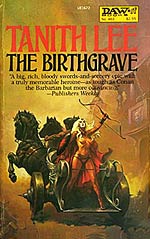
![]() verkisto
verkisto
7/29/2016
![]()
The news of Lee's death last year inspired me to read something of hers, and The Birthgrave was at the top of lots of recommendation lists, so I picked this one. I've read one of her books before -- Heartbeast, back in the '90s -- and didn't think much of it, but I like to think that my tastes have matured since then. Still, I went into this book with some reluctance. It's lengthy and has small type, and I wasn't sure if I was ready for a style like Lee's. In the end, I was surprised I liked this book as much as I did.
The book, Lee's first published novel for adults, is about a nameless woman who at the start of the story walks out of a volcano as a cursed woman. She's immortal, and the mortals she encounters on her journey regard her as a goddess, but her goal is to find a glistening jade that will help her identify who she is. The story is about her journey to find that jade, and discover her identity.
Early in the reading, I remarked that it was a good story, but it wasn't something that begged to be picked up and read. I could read a section or a chapter, set it down, play a game on my phone, get up and get a snack, do a chore or two, and then come back to continue the story. At the same time, that pace fits the story well. We're going along on the main character's journey, and it's not something that can be rushed through. By the same token, when Lee wrote her action scenes, it was hard to stop reading. The chariot race, specifically, was one of the most engaging scenes of the novel.
Lee's style is poetic and flowing, sensual and personal, and there's a definite feminist angle to the story. The narrator isn't a damsel to be saved, isn't beholden to anyone, belongs to no one, and she takes her lovers as she will, without regret or worry. She's a strong character, not just because she's immortal and skilled, but because she has an identity that is all her own. The story is about her building that identity, so the further we go into the story, the better we understand the character.
The story is broken down into three sections, and in each one, the narrator encounters three tribes, and gets involved with three men. In the first section, the relationship is one of respect and admiration, as much as one could expect in a barbaric, patriarchal tribe. In the second section, she is arranged into a relationship with first one man, and then another. In the third section, she is forced into a relationship, as the tribe she encounters takes her in as a slave. It was an intriguing look at male-female relationships, more so when considering that the novel was published in 1977. Lee also examines power in each section, first as a gift, then as a controlling factor, and then having none. Interestingly, that examination converges nicely with her examination of the narrator's relationships.
I wasn't pleased with the ending. By the end of the novel, the narrator learns her name and her identity and history, which was the point of the story, but the means by which she learned all that seemed like a cop-out. It doesn't spoil the entire book, but it does feel like a cheat, and it left me feeling like it could have been handled better.
I still highly recommend the novel, especially for anyone who hasn't read Lee before. Despite my reluctance going into the book, and my disappointment with the ending, I liked it enough to get the next two books in the series, if for no other reason than for how Lee writes her narrative and her themes. In the end, The Birthgrave is a book that demands patience, but rewards you for it.